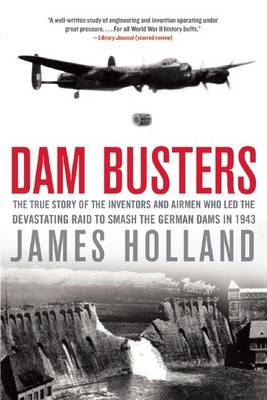
- Retrait gratuit dans votre magasin Club
- 7.000.000 titres dans notre catalogue
- Payer en toute sécurité
- Toujours un magasin près de chez vous
- Retrait gratuit dans votre magasin Club
- 7.000.0000 titres dans notre catalogue
- Payer en toute sécurité
- Toujours un magasin près de chez vous
Dam Busters
The True Story of the Inventors and Airmen Who Led the Devastating Raid to Smash the German Dams in 1943
James Holland
Livre broché | Anglais
24,95 €
+ 49 points
Format
Description
The night of May 16, 1943. Nineteen specially adapted Lancaster bombers take off from an RAF airfield in Lincolnshire, England, each with a huge nine-thousand-pound cylindrical bomb strapped underneath it. Their mission: to head deep into the German heartland and destroy three hydroelectric dams that power the Third Reich's war machine. From the outset it was an almost impossible task, a suicide mission. First the men had to fly extremely low, at night, and in tight formation over miles of enemy-occupied territory. Then, just sixty feet above the water and at some of the most heavily defended targets in Germany, they had to drop with pinpoint precision a complicated spinning cylindrical bomb that had never before been used operationally. More than that, the entire operation had to be put together in less than ten weeks, while the water levels in the dams were still high enough for the bombs to be effective. When the visionary aviation engineer Barnes Wallis's concept of the bouncing bomb was green-lighted, he hadn't even drawn up the plans for the weapon that was to smash the dams. What followed was an incredible race against time that, despite numerous setbacks and against huge odds, became one of the most successful and game-changing bombing raids of all time. James Holland's Dam Busters is meticulously researched and brilliantly told, sure to be the definitive history of this incredible raid.
Spécifications
Parties prenantes
- Auteur(s) :
- Editeur:
Contenu
- Nombre de pages :
- 464
- Langue:
- Anglais
Caractéristiques
- EAN:
- 9780802122780
- Date de parution :
- 11-11-14
- Format:
- Livre broché
- Format numérique:
- Trade paperback (VS)
- Dimensions :
- 152 mm x 226 mm
- Poids :
- 635 g

Les avis
Nous publions uniquement les avis qui respectent les conditions requises. Consultez nos conditions pour les avis.






